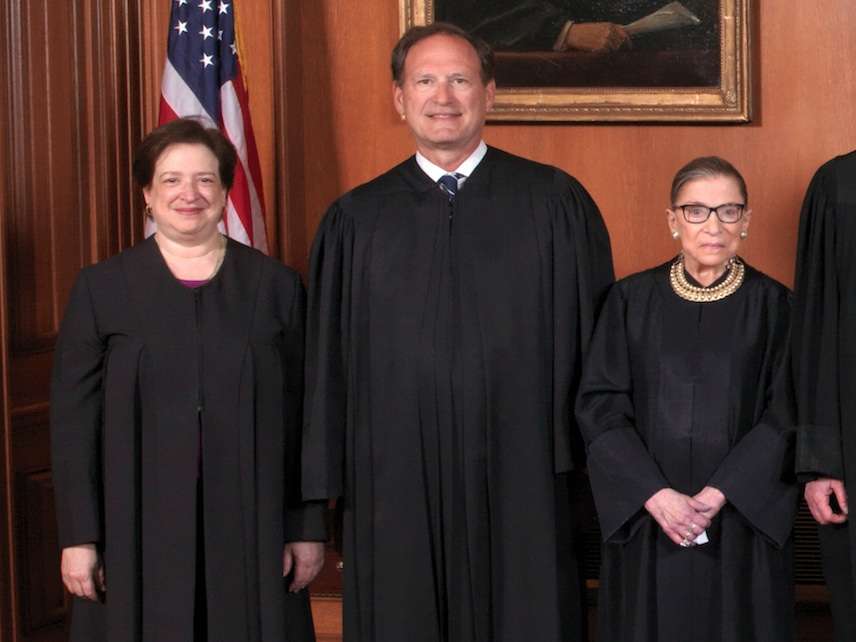Justices Alito and Gorsuch Clash Over Cellphones, Privacy, and Property Rights
Oral arguments in Carpenter v. U.S. reveal a division between two conservative justices.

It's common to think of the U.S. Supreme Court in terms of liberal vs. conservative decisions, liberal vs. conservative doctrines, and liberal vs. conservative justices. But in the recent oral arguments in Carpenter v. United States, one of the biggest disagreements occurred between two of the Court's conservative members, Samuel Alito and Neil Gorsuch.
At issue in Carpenter v. U.S. is whether federal law enforcement officials violated the Fourth Amendment by acquiring the cellphone phone records of a suspected armed robber, Timothy Carpenter, without first obtaining a search warrant for those records. Thanks to the information they obtained, federal investigators were able to trace back Carpenter's whereabouts during the time periods when several of his alleged crimes were committed, placing him in the vicinity of those crimes. That information was used against Carpenter in court.
The government insists that this warrantless search did not violate Carpenter's Fourth Amendment rights because, in the words of the Supreme Court's 1979 ruling in Smith v. Maryland, "a person has no legitimate expectation of privacy in information he voluntarily turns over to third parties." In other words, Carpenter has no Fourth Amendment right to privacy in his cellphone records because he voluntarily used his cellphone, thus voluntarily disclosing his location to the various cellphone towers that handled his calls.
Throughout the November 29 oral arguments, Justice Alito was perhaps the most supportive of the government's position and the most critical of Carpenter's arguments. Justice Gorsuch, on the other hand, seemed extremely skeptical of the government's stance. Gorsuch even suggested at one point that the government's position was at odds with the "original understanding of the Constitution"—not exactly a compliment, since Gorsuch is a self-professed originalist.
But the real clash occurred after Gorsuch asked Deputy Solicitor General Michael Dreeben to set aside the "third party" aspect of the debate and focus instead on whether the Fourth Amendment's protection against unreasonable searches of a person's "papers and effects" should apply to the sort of digital information at issue here.
"Let's say I have a property right" in my cellphone records, Gorsuch began. "Wouldn't that" make the government's actions "a search of my paper or effect under the property-based approach" to the Fourth Amendment?
Dreeben thought not. "It's not your paper or effect," he said. "The problem with your hypothetical," he told Gorsuch, "is that it creates a property interest out of transfers of information."
Gorsuch tried again. "Under my hypothetical, you have a property right in this information." So, "would it be a search of my paper or effect" for the government to obtain the information, he asked the deputy solicitor general. "Yes or no."
"I am not sure," Dreeben replied. "And the reason that I am not sure is there has never been a property right recognized in information that's conveyed to a business of this character." In fact, Dreeben went on to add, "it's a property right that resembles no property right that's existed."
At this point, Justice Alito entered the conversation. His intervention can best be described as throwing a lifeline to Dreeben while at the same time trying to quash Gorsuch's entire line of questioning.
"Yeah, Mr. Dreeben, along those lines," Alito said, "I was trying to think of an example of a situation in which a person would have a property right in information that the person doesn't ask a third party to create, the person can't force the third party to create it or gather it. The person can't prevent the company from gathering it. The person can't force the company to destroy it. The person can't prevent the company from destroying it."
Dreeben followed Alito's lead. "Justice Alito, those are a lot of good reasons on why this should not be recognized as a property interest," he promptly replied. "I can't think of anything that would be characterized as a property interest with those traits. And it would be a—really a watershed change in the law to treat transferred information as property."
But Gorsuch would not be deterred by Alito. Doesn't the Stored Communications Act, Gorsuch asked, "declare this customer proprietary information?" Are you saying "the government can acknowledge a property right but then strip it of any Fourth Amendment protection? Is that the government's position?"
While Dreeben was still responding to that query, Alito stepped back in again with an answer of his own. "Mr. Dreeben," Alito said, "I would read the—the—the phrase 'customer proprietary information' to mean that it is proprietary to the cellphone company and, is therefore, not to the customer. It's customer information, but it's proprietary information about the cellphone company because, if you got that information in the aggregate, you could tell a lot about the company's operation."
In short, Gorsuch proffered a property rights argument that might allow Carpenter to win the case, and Alito came out swinging hard against it.
We'll find out later this term whether the two conservative justices continue their disagreement via written opinion.
